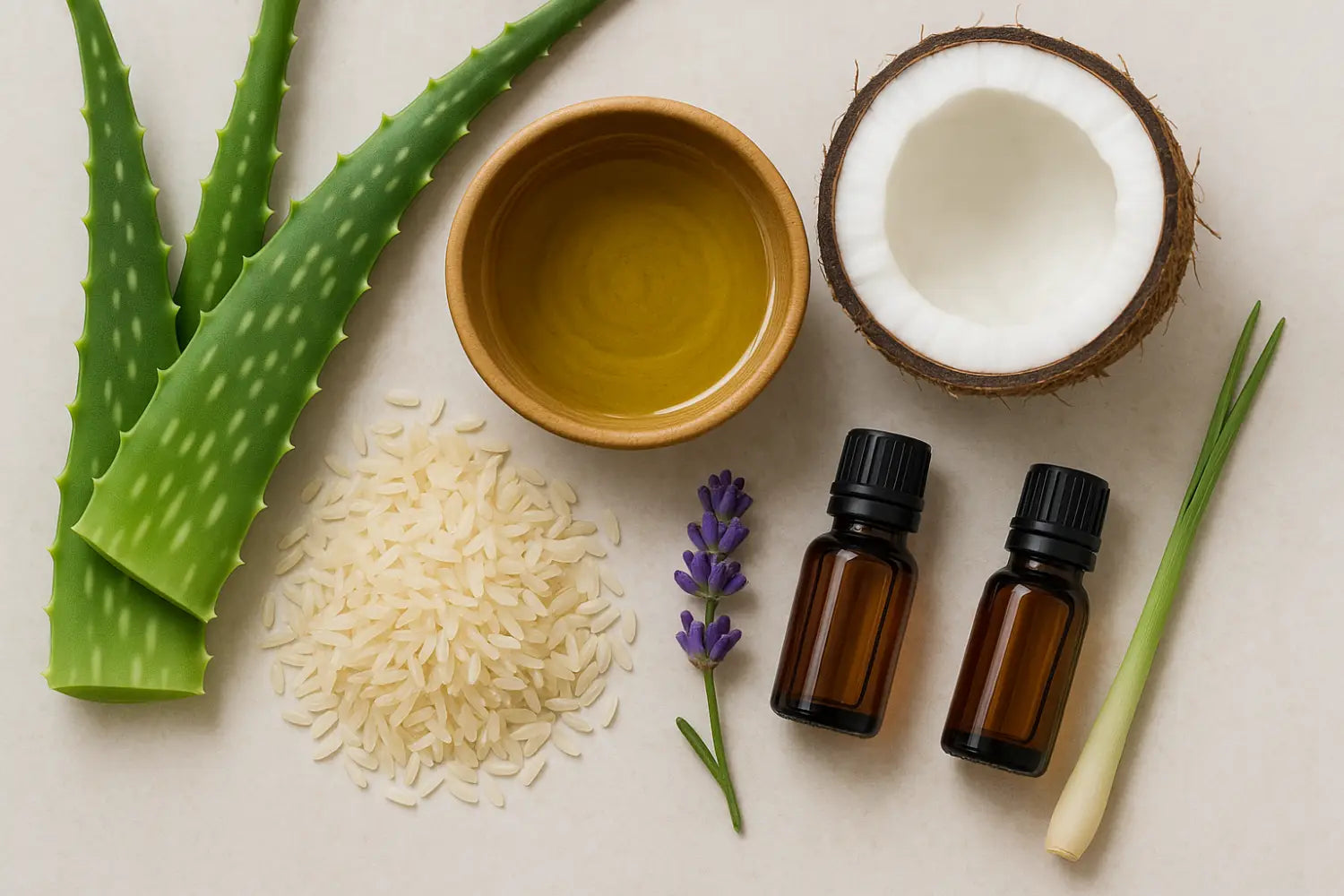7 Science-Backed Natural Ingredients That Help Improve Crepey Skin
Table of Contents
- Why Skin Becomes Crepey
- The Science Behind Skin Barrier Health
- 7 Natural Ingredients That Work
- Daily Application Guide
- Expected Results Timeline
-
Supporting Your Skin Health
- Scroll to bottom to see Natural Escapes products designed for crepey skin.
Quick Takeaways
- Main Problem: Crepey skin results from collagen loss, lipid depletion, and barrier damage
- Solution: Targeted natural ingredients can rebuild your skin barrier and restore firmness
- Timeline: Most people see improvements in 4-8 weeks with consistent use
- Key Ingredients: Rice ceramides, olive oil, coconut oil, avocado oil, aloe vera, glycerin, and essential oils
Why Skin Develops a Crepey Appearance
Crepey skin—that thin, finely wrinkled texture showing up on your arms, chest, and neck—develops through several interconnected processes:
The Primary Culprits:
- Collagen and Elastin Loss: After age 40, these crucial proteins decline by approximately 1% annually
- Lipid Depletion: Ceramide levels can drop by up to 40%, compromising moisture retention
- UV Damage: Sun exposure accelerates collagen breakdown and creates oxidative stress
- Glycation and Inflammation: Chronic micro-inflammation stiffens collagen fibers
The result? Skin becomes thinner, less elastic, and unable to bounce back from daily stress.
Understanding Your Skin Barrier: The Foundation of Healthy Skin
Your skin's outer layer (stratum corneum) functions like a protective brick wall with three essential components:
- Ceramides (50%): The "mortar" binding skin cells together
- Cholesterol (25%): Maintains structural integrity
- Fatty acids (15%): Support flexibility and hydration
When this barrier breaks down:
- Moisture escapes through increased transepidermal water loss (TEWL)
- Skin becomes more sensitive and prone to damage
- Collagen breakdown accelerates
The solution lies in restoring these lipids alongside humectants and antioxidants.
7 Research-Proven Natural Ingredients for Crepey Skin

1. 🌾 Rice-Derived Ceramides
Why They Work: Rice ceramides are among the most effective natural ingredients for rebuilding compromised skin barriers.
Clinical Benefits:
- Replace lost ceramides for improved moisture retention
- Enhance skin elasticity and smoothness
- Support healthy pH balance and reduce dryness
Research Findings: Studies show rice ceramides can reduce TEWL by 20-35% and improve skin elasticity within 4-8 weeks of consistent topical application.
Clinical Reference: Effect of Rice Ceramides on Skin Barrier Function, Nutrients, 2022
2. 🫒 Extra-Virgin Olive Oil
Why It Works: Delivers essential fatty acids and powerful polyphenol antioxidants that protect and repair aging skin.
Clinical Benefits:
- Polyphenols boost the activity of skin cells (fibroblasts) crucial for skin repair.
- They help increase important building blocks that support skin structure and healing.
- Provides long-lasting moisture.
Research Findings: Lab studies show that olive oil polyphenols make skin cells grow and move better, which is helpful for healing and maintaining healthy skin.
Clinical Reference: The Benefits of Olive Oil for Skin Health: Study on the Effect of Hydroxytyrosol, Tyrosol, and Oleocanthal on Human Fibroblasts, Nutrients, 2023
3. 🥥 Virgin Coconut Oil
Why It Works: Creates a protective barrier while delivering anti-inflammatory compounds that calm irritated skin.
Clinical Benefits:
- Medium-chain triglycerides form a protective moisture seal
- Natural antimicrobial and anti-inflammatory properties
- Supports barrier repair and reduces sensitivity
Research Findings: Clinical studies confirm virgin coconut oil significantly improves skin hydration and lipid levels in compromised skin.
Clinical Reference: Coconut Oil in Dermatology, International Journal of Dermatology, 2018
4. 🥑 Cold-Pressed Avocado Oil
Why It Works: Rich in beneficial fatty acids and vitamins, including Vitamin E, that work to reduce wrinkles, boost collagen production, and improve skin elasticity.
Clinical Benefits:
- High concentration of oleic acid and Vitamin E.
- Stimulates the skin's natural collagen and elastin production.
- Enhances the skin's protective barrier and helps in nutrient absorption.
Research Findings: Research confirms avocado oil's ability to improve skin barrier recovery and enhance collagen synthesis. Studies have also shown its anti-aging potential, leading to reduced wrinkles and smoother skin.
Clinical Reference: This section is adapted from: The Potential of Avocado Oil for Topical Use: A Narrative Review, ResearchGate, 2024 (https://www.researchgate.net/publication/381939597_The_Potential_of_Avocado_Oil_for_Topical_Use_A_Narrative_Review). This material is licensed under CC BY-SA 4.0 (https://creativecommons.org/licenses/by-sa/4.0/).
5. 🌿 Whole-Leaf Aloe Vera
Why It Works: Contains mucopolysaccharides that deeply hydrate the skin, along with compounds that stimulate collagen and elastin production, and possess anti-inflammatory properties.
Clinical Benefits:
- Binds moisture to the skin for enhanced and lasting hydration.
- Reduces redness and inflammation, improving skin integrity.
- Stimulates the production of collagen and elastin, contributing to improved skin elasticity and firmness.
Research Findings: Reviewed studies indicate that aloe vera can improve skin elasticity, enhance overall skin integrity, and help reduce the appearance of fine wrinkles.
Clinical Reference: Aloe vera: A short review, Indian Journal of Dermatology, 2008
6. 💧 Glycerin
Why It Works: As a powerful humectant, glycerin draws moisture from the environment into your skin, helping to maintain essential hydration levels and support the skin's natural barrier function.
Clinical Benefits:
- Effectively attracts and retains water in the outer layers of the skin, leading to deep hydration.
- Improves the skin's overall smoothness and elasticity.
- Supports the natural function of aquaporin water channels, which are vital for efficient moisture distribution within the skin.
Research Findings: Scientific reviews consistently demonstrate glycerin's ability to significantly increase skin hydration and highlight its role in enhancing moisture transport mechanisms, including through aquaporin channels.
Clinical Reference: Glycerol and the skin: holistic approach to its origin and functions, International Journal of Cosmetic Science, 2008
7. 🌸 Essential Oils (Lavender & Lemongrass)
Lavender Oil Benefits:
Why It Works: Contains antioxidants that help combat free radicals, and supports the skin's natural healing processes, including stimulating collagen production.
Clinical Benefits:
- Provides antioxidant protection, potentially reducing the appearance of fine lines and wrinkles.
- Promotes faster wound healing and aids in reducing scarring by stimulating tissue repair.
- Offers antibacterial and antifungal properties that may help with acne and certain skin conditions.
Lemongrass Oil Benefits:
Why It Works: Rich in citral, a powerful antioxidant and anti-inflammatory compound, it helps reduce oxidative stress and inflammation in skin cells.
Clinical Benefits:
- Reduces inflammatory responses in human skin cells.
- Protects against oxidative stress and associated DNA damage.
- Shows potential to inhibit enzymes (MMPs) that can break down collagen, supporting skin's integrity.
Research Findings: Studies on lavender oil in rats have shown improved wound healing and stimulated collagen production. For lemongrass, in vitro studies highlight its significant anti-inflammatory activity in human dermal fibroblasts and its antioxidant effects, along with potential to inhibit collagen-degrading enzymes.
Clinical References:
- Lavender oil for skin: Benefits, uses, and safety, Medical News Today, 2020
- Lemongrass (Cymbopogon flexuosus) essential oil demonstrated anti-inflammatory effect in pre-inflamed human dermal fibroblasts, PMC, 2017
- Cytoprotective Properties of Citronella Oil (Cymbopogon nardus (L.) Rendl.) and Lemongrass Oil (Cymbopogon citratus (DC.) Stapf) through Attenuation of Senescent-Induced Chemotherapeutic Agent Doxorubicin on Vero and NIH-3T3 Cells, PMC, 2023
Daily Application Guide for Maximum Results
Morning Routine:
- Apply to clean, slightly damp skin
- Use gentle upward motions
- Allow 5-10 minutes for absorption
- Always follow with SPF 30+ sunscreen
Evening Routine:
- Cleanse skin thoroughly
- Apply while skin is still damp
- Use slightly more product than morning
- Gently massage in circular motions
Pro Tips:
- Consistency is key—apply twice daily without skipping
- Start with a small amount and increase as needed
- Store products in cool, dry places to maintain potency
- Choose products with multiple complementary ingredients rather than single oils for best results
- Look for formulations that include all the key ingredients mentioned above for comprehensive care
Expected Results Timeline
Week 1-2: Improved hydration and softer texture Week 3-4: Reduced roughness and enhanced smoothness Week 5-8: Visible improvement in skin firmness and elasticity Week 9-12: Significant reduction in crepey appearance
Note: Individual results may vary based on skin condition, age, and consistency of use.
Supporting Your Skin Health Journey
Beyond topical treatments, support your skin health with these evidence-based practices:
- Daily sun protection with broad-spectrum SPF 30+
- Antioxidant-rich diet including berries, leafy greens, and healthy fats
- Adequate hydration (8-10 glasses of water daily)
- Quality sleep (7-9 hours nightly for optimal skin repair)
- Stress management through meditation or regular exercise
The Solution in One Bottle
At Natural Escapes Body, our Aloe & Olive Hand & Body Lotion in Lavender and Lemongrass combine all these research-backed ingredients:
✓ Rice ceramides for barrier repair
✓ Whole-leaf aloe vera and glycerin for hydration
✓ Extra-virgin olive, coconut, and avocado oils for nourishment
✓ Plant-powered essential oils for antioxidant protection
Our clean, naturally-derived formulations align with clinical research protocols proven effective for improving crepey, aging skin through twice-daily application.
About the Author
Melissa is the founder of Natural Escapes Body. With over 25 years of experience handcrafting naturally-derived, plant-based skincare, she combines science and tradition to create formulas that are safe, effective, and luxurious. Her work is grounded in research, transparent ingredient sourcing, and a commitment to cruelty-free wellness.
Ready to transform your skin? Start with consistent application of these natural ingredients and be patient—your skin will thank you for the science-backed nourishment.
Frequently Asked Questions


